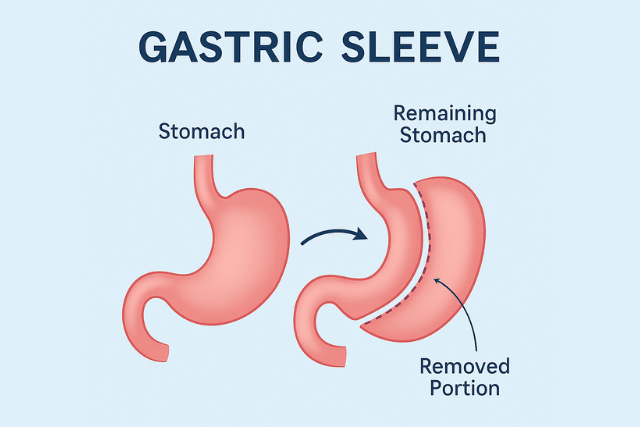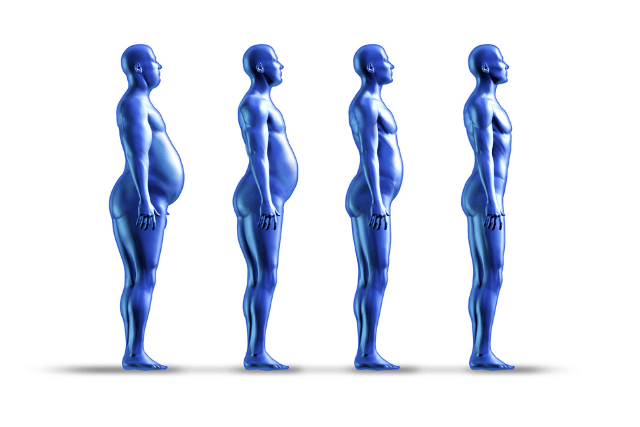When it comes to weight loss surgery, two popular options dominate the conversation: gastric sleeve and gastric bypass. Both procedures can help individuals achieve significant weight loss and improve related health conditions. However, each surgery has unique characteristics, benefits, and risks. So, how do you determine which option is right for you?
In this article, we’ll explore the differences between Gastric Sleeve vs. Gastric Bypass and weigh their pros and cons. We’ll help you decide which weight loss surgery fits your lifestyle and health needs.
What is Gastric Sleeve Surgery?
Gastric sleeve surgery, also known as sleeve gastrectomy, is a weight loss procedure that involves removing a significant portion of the stomach, leaving a smaller, sleeve-shaped stomach. This procedure limits the amount of food you can consume, helping you feel fuller faster and reducing your overall caloric intake. The surgery is often performed laparoscopically, which means it involves small incisions and a quicker recovery time.

Advantages of Gastric Sleeve Surgery
- Minimal Impact on Digestion: Unlike gastric bypass, the gastric sleeve does not alter the digestive process significantly. The intestines remain intact, which means you won’t have to deal with malabsorption or changes in nutrient absorption.
- Simpler Procedure: Gastric sleeve is often considered a simpler and less complicated surgery than gastric bypass. There’s no need for rerouting the intestines, which makes it a less invasive procedure.
- Significant Weight Loss: Many patients experience significant weight loss following gastric sleeve surgery, with some individuals losing up to 60-70% of their excess weight within the first year.
- Reduced Hunger: By removing a portion of the stomach, gastric sleeve surgery helps reduce hunger-stimulating hormones, making it easier to control food intake and make healthier food choices.
Disadvantages of Gastric Sleeve Surgery
- Irreversible: Since a large part of the stomach is permanently removed, gastric sleeve surgery is irreversible. It’s essential to carefully consider whether this procedure is the right choice for you.
- Risk of GERD: Some patients may experience gastroesophageal reflux disease (GERD) after gastric sleeve surgery, leading to heartburn and discomfort
- Nutritional Deficiencies: Although gastric sleeve doesn’t cause malabsorption like gastric bypass, patients may still develop nutritional deficiencies if they don’t follow proper dietary guidelines and take supplements.
What is Gastric Bypass Surgery?
Gastric bypass surgery creates a small stomach pouch and reroutes the small intestine, limiting food intake and nutrient absorption. This surgery reduces food intake while also decreasing the calories and nutrients absorbed by your body.

Advantages of Gastric Bypass Surgery
- Significant Weight Loss: Gastric bypass generally results in more significant and quicker weight loss compared to gastric sleeve. Many patients can lose 70-80% of their excess weight within the first year.
- Improvement in Health Conditions: Gastric bypass can significantly improve or even resolve obesity-related health conditions, such as Type 2 diabetes, sleep apnea, and high blood pressure. The surgery alters the way your body processes food, which can help with insulin sensitivity and improve overall metabolic health.
- Long-Term Effectiveness: Studies show that gastric bypass tends to maintain weight loss over the long term better than gastric sleeve, especially when combined with lifestyle changes and consistent follow-up care.
- Reduced Hunger: Like gastric sleeve, gastric bypass also helps reduce hunger by lowering hunger-inducing hormones, leading to a decrease in appetite and improved portion control.
Disadvantages of Gastric Bypass Surgery
- More Complex Procedure: Gastric bypass is a more complex procedure than gastric sleeve. The rerouting of the intestines makes the surgery longer, and the recovery time is often more extended.
- Risk of Nutritional Deficiencies: Gastric bypass surgery comes with a higher risk of malnutrition and vitamin deficiencies, particularly in vitamins B12, iron, and calcium. Patients must adhere to strict supplement regimens post-surgery.
- Irreversible : Similar to gastric sleeve, gastric bypass surgery is irreversible. Once the intestines are rerouted, it’s impossible to reverse the changes made to your digestive system.
Gastric Sleeve vs. Gastric Bypass: Which One is Right for You?
Both gastric sleeve and gastric bypass have proven to be effective solutions for weight loss and health improvement. However, the right procedure for you depends on several factors, including your health conditions, weight loss goals, and willingness to commit to long-term lifestyle changes.
Here are some key considerations to help you choose the best surgery for you:
Weight Loss Goals
If you’re looking for faster and more substantial weight loss, gastric bypass might be the better option. It typically results in quicker weight loss and may be more suitable for those with severe obesity. If you’re seeking a simpler, less invasive option, gastric sleeve may be ideal due to its lower complexity and risks.
Health Conditions
Gastric bypass is effective for obesity-related health conditions like Type 2 diabetes, hypertension, and sleep apnea, offering health improvement. However, gastric sleeve is effective for weight loss and improving health conditions, though its results may be less significant.
Recovery and Lifestyle
Gastric Sleeve vs. gastric bypass: Gastric sleeve has a shorter recovery time and a more manageable post-surgery lifestyle. It requires fewer dietary changes and supplements. In contrast, gastric bypass offers long-term weight loss and health benefits but demands stricter dietary adherence and regular follow-ups.
Nutritional Considerations
If you are concerned about potential nutritional deficiencies, gastric sleeve may be the better option since it doesn’t cause malabsorption of nutrients. With gastric bypass, you will need to take daily supplements and follow a strict diet to prevent deficiencies.
Reversibility
Both procedures are permanent and cannot be undone, so it’s important to thoroughly consider all options before making a decision.
Conclusion
In the battle of gastric sleeve vs. gastric bypass, the right weight loss surgery for you depends on various factors. If you are looking for a less invasive option with a quicker recovery time, gastric sleeve may be the ideal choice. However, if you are aiming for more significant weight loss and improved metabolic health, gastric bypass might be the best fit.
Both surgeries require lifelong dietary changes and follow-up, offering significant health and quality of life improvements. Consult a healthcare professional to guide you based on your needs, medical history, and weight loss goals.
Schedule a consultation with us today to evaluate the best option for you and take the first step towards a healthier future.










